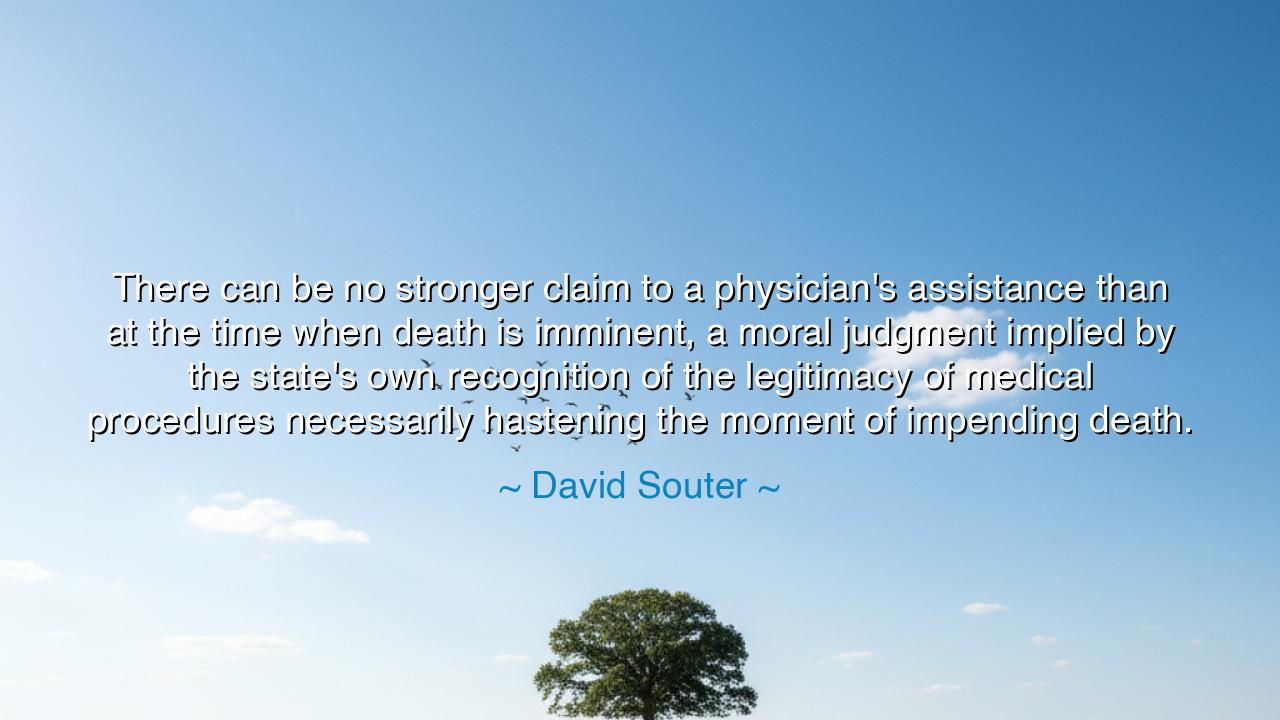
There can be no stronger claim to a physician's assistance than
There can be no stronger claim to a physician's assistance than at the time when death is imminent, a moral judgment implied by the state's own recognition of the legitimacy of medical procedures necessarily hastening the moment of impending death.






When Justice David Souter declared, “There can be no stronger claim to a physician's assistance than at the time when death is imminent, a moral judgment implied by the state's own recognition of the legitimacy of medical procedures necessarily hastening the moment of impending death,” he unveiled a truth both grave and luminous: that the duty of the healer reaches its most sacred height not in preserving life at all costs, but in accompanying the soul as it nears the threshold of eternity. These words, heavy with the weight of compassion and law, echo like a bell across time, reminding us that even in the shadow of death, the bond between physician and patient remains unbroken.
The physician’s assistance is not merely technical; it is profoundly moral. When death approaches, and the body’s strength falters, what remains is the healer’s presence—a hand, a word, an act that eases suffering. Souter’s words recognize that the state itself, in permitting medical procedures that may hasten death, acknowledges the higher law of mercy. For to prolong agony when relief is possible is to betray the very spirit of medicine, which is not only to cure, but also to care.
History itself bears witness to this truth. Consider the example of the Athenian philosopher Socrates, who, condemned to drink the hemlock, faced his death with calm dignity. Though his end was decreed by the state, his companions stood by, ensuring his passing was not lonely. In a different age and with different tools, physicians now play this role: guiding those at the edge of life, so that their transition is not marked by torment but by dignity. Just as Socrates taught philosophy with his last breath, so too does the physician teach us that mercy is greater than blind prolongation.
In these words lies also the recognition of moral judgment. For what is the law if not a reflection of human conscience? Souter speaks not merely of legality, but of the sacred convergence between law and compassion. When the state permits procedures that shorten suffering, it implicitly affirms that compassion is not weakness, but justice. This truth stands as a shield against those who would mistake endurance of pain for virtue, or who would demand that life be stretched beyond its natural thread.
Yet we must not hear these words as permission for carelessness. Rather, they call for discernment. The physician stands in a place of immense responsibility, as one who holds both life and death in his hands. Like the Roman general who must choose between battle or retreat, the healer must weigh each act in the balance of mercy and harm. This is not a role for the faint-hearted, but for those who embrace both wisdom and humility.
For us, who are not physicians, the lesson remains powerful. We are reminded that when those we love near their final hour, our presence, our compassion, and our willingness to relieve suffering are the truest forms of loyalty. To stand by another at the edge of life is to reflect the eternal law of love, stronger even than the decrees of kings or courts. Just as the physician assists with medicines, we may assist with gentleness, patience, and the courage to let go.
Therefore, children of tomorrow, let this wisdom guide you: do not cling blindly to life when suffering consumes it, nor turn your face from those in pain. Seek always the higher law of mercy. In your daily walk, practice compassion in small ways, so that when the great tests come, your heart will be steady. Listen deeply, act kindly, and remember that dignity in death is as sacred as vitality in life. In this, you fulfill not only the law of man, but the eternal law written in the soul.
Thus, Souter’s words remind us: the strongest claim upon us is compassion at the threshold of death. Let us live so that when our time comes, and when the time comes for those we love, we will know how to walk with dignity, guided by mercy, into the great unknown.






AAdministratorAdministrator
Welcome, honored guests. Please leave a comment, we will respond soon